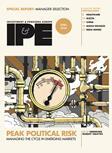GLOBAL - The large majority of pension funds are too small and too reliant on unnecessarily complex governance structures to succeed, Keith Ambachtsheer of the Rotman International Centre for Pension Management (ICPM) has argued.
Speaking at the third annual FairPensions lecture, the native Dutchman also welcomed his countrymen’s attempts to reassemble the Netherlands’ pension system and praised the UK’s National Employment Savings Trust (NEST), saying it resembled a pension plan he suggested three years ago the Canadian government should launch.
Ambachtsheer, director of ICPN and a previous winner of IPE’s Outstanding Industry Contribution award, also stressed the importance of strong governance and highlighted the importance of competitive compensation packages for internal investment teams.
“You need scale to be successful in this business,” he said. “You need large-scale pension delivery organisations. We need compensation schemes inside those organisations that allow those organisations to be competitive on the people-side.”
He argued that, even if an internal investment team each demanded a hypothetical salary of $1m, if this brought down overall external asset management costs, it was worth considering.
He also argued that pension funds unable to manage their own assets were at a “huge disadvantage”, as it was only once an internal capability was demonstrated that outside asset managers would respect schemes.
Responding to Ambachtsheer’s lecture, Mark Fawcett, chief investment officer at NEST, agreed with many of the points raised, saying it was in his scheme’s DNA to be a long-term investor.
He also said that much could be learned from the investment approach taken by Canadian pension funds and cited Ontario Municipal Employees Retirement System’s joint ownership of the Channel Tunnel rail link with Ontario Teachers’ Pension Plan.
“As a result of having it in-house, they benefit fully from the growth of those investments,” he said, adding that this allowed them to “capture all that value in-house”.
Challenged by Bill Galvin, chief executive of the UK Pensions Regulator, on the question of whether the creation of these large-scale vehicles did not risk creating a small number of larger schemes that would then lead to systemic risk, Ambachtsheer countered that this could be avoided by having a clear set of rules to ensure each pension organisation delivered on its promises.
“Another thing to keep in mind: If you play this strictly inside your own country, you are missing a huge competitive advantage,” he said.
“You should be benchmarking yourself against the best in the world. The best in the world are organisations that seem to be in the order of magnitude of $100bn (€74bn) and 250,000 to 300,000 members.”
Ambachtsheer praised the Dutch for the ongoing “major debate” on how to reassemble its pensions system and guarantee its long-term sustainability in the wake of the country’s new Pension Agreement.
He said the Dutch were looking to implement a long-horizon investment programme, as well as investing so that payment certainty was allowed.












No comments yet